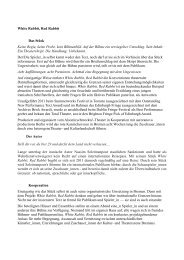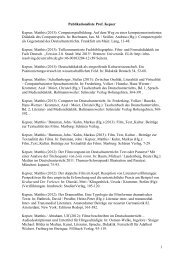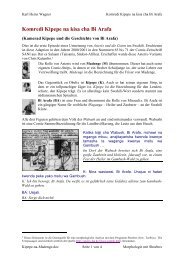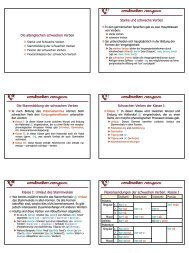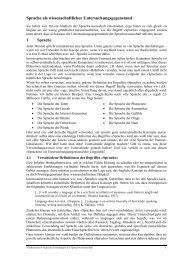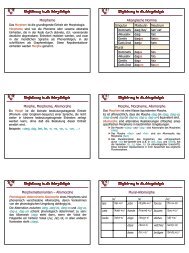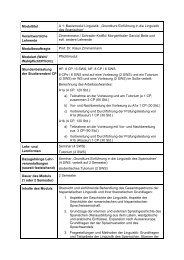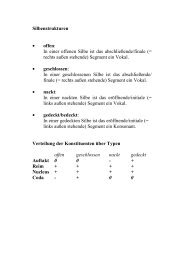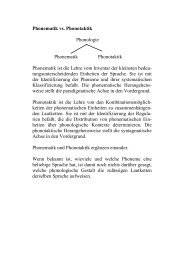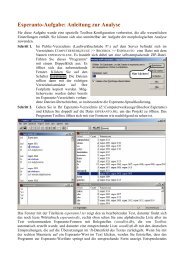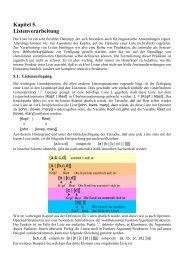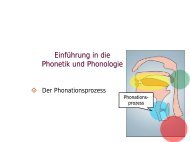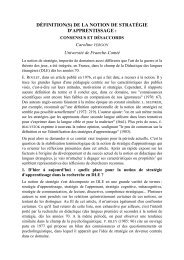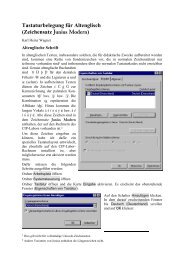Relativism and Universalism in Linguistics - Fachbereich 10 ...
Relativism and Universalism in Linguistics - Fachbereich 10 ...
Relativism and Universalism in Linguistics - Fachbereich 10 ...
You also want an ePaper? Increase the reach of your titles
YUMPU automatically turns print PDFs into web optimized ePapers that Google loves.
Workshop 5 – Gro 175<br />
isl<strong>and</strong> violat<strong>in</strong>g questions <strong>and</strong> relative clauses <strong>in</strong> English, Greek <strong>and</strong> German <strong>and</strong> present novel<br />
data from Italian <strong>and</strong> Hebrew, where the ma<strong>in</strong> f<strong>in</strong>d<strong>in</strong>g is that resumption fails to “save” isl<strong>and</strong><br />
violations <strong>in</strong> questions. I will present the basics of a process<strong>in</strong>g account for these results.<br />
In the second part of the talk I will focus on the relation between true <strong>and</strong> <strong>in</strong>trusive<br />
resumption. Based on evidence from resumption <strong>in</strong> Greek oblique relative clauses, a case<br />
which seems to lie between “true” <strong>and</strong> “<strong>in</strong>trusive” resumption, I will argue that while the<br />
dist<strong>in</strong>ction between the two types of resumption is <strong>in</strong>dispensable, “true” <strong>and</strong> “<strong>in</strong>trusive”<br />
appear to be the ends of a cont<strong>in</strong>uum, the close <strong>in</strong>vestigation of which can possibly shed light<br />
to the <strong>in</strong>terface between grammar <strong>and</strong> the human sentence processor.<br />
Covert Partial Wh-Movement <strong>in</strong> English<br />
Cheng, Lisa / Demirdache, Hamida<br />
Leiden / Nantes<br />
l.l.cheng@leidenuniv.nl;hamida.demirdache@humana.univ-nantes.fr<br />
In this paper, we argue that there is partial wh-movement <strong>in</strong> English at LF based on the<br />
<strong>in</strong>terpretations of multiple wh-questions <strong>in</strong> English.<br />
Nom<strong>in</strong>al <strong>and</strong> Verbal Quotative Constructions <strong>in</strong> Iberian Spanish<br />
Etxepare, Ricardo<br />
Bayonne<br />
retxepare@euskalnet.net<br />
In colloquial speech, ma<strong>in</strong> clauses <strong>in</strong> Iberian Spanish can be headed by an overt<br />
complementizer (see Spitzer 1942, Porroche Ballesteros 1995, García 1996, Etxepare 2002,<br />
forthcom<strong>in</strong>g):<br />
(1) a. Juan/oye, el Liverpool ha ganado la Champions.<br />
Juan/hey, the Liverpool has won the Champions League<br />
b. Juan/oye, que el Liverpool ha ganado la Champions.<br />
Juan/hey that the Liverpool has won the Champions League<br />
The apparent optionality of the complementizer masks an important semantic difference<br />
between the a- <strong>and</strong> b-sentences. As a typical declarative sentence, (1a) constitutes an<br />
assertion, whose propositional content is that a given soccer team (Liverpool) has won the<br />
Champions League. Compared to (1a), (1b), uttered with declarative <strong>in</strong>tonation, contributes<br />
the additional mean<strong>in</strong>g that someone else (who is not the speaker) said (1a), such that the<br />
(speaker’s) utterance of (1b) constitutes a report of what has been said. (1b) is thus reported<br />
speech (Coulmas 1986). The two sentences would be produced <strong>in</strong> quite different situations:<br />
(1a) could be uttered by an agent who has been to the f<strong>in</strong>als match; <strong>in</strong> such a sett<strong>in</strong>g (1b)<br />
would def<strong>in</strong>itely be odd. (1b), on the other h<strong>and</strong>, would be appropriate if I were listen<strong>in</strong>g to<br />
the radio <strong>and</strong> heard the news that Liverpool won the Champions League. In that case, I could<br />
choose to report on the news by us<strong>in</strong>g the root complementizer construction.<br />
This paper is a prelim<strong>in</strong>ary analysis of root complementizer constructions <strong>in</strong> Iberian Spanish.<br />
I will defend the view that root complementizer constructions <strong>in</strong>volve an underly<strong>in</strong>g speech<br />
eventuality. This speech eventuality is syntactically represented <strong>in</strong> two different ways: (i) as a<br />
VP support<strong>in</strong>g (eventually overt) thematic material; <strong>and</strong> (ii) as a DP, contribut<strong>in</strong>g an<br />
existential quantification over variables referr<strong>in</strong>g to utterances (an analysis similar to Lahiri’s<br />
2002 for double-Comp dependents <strong>in</strong> Spanish).



